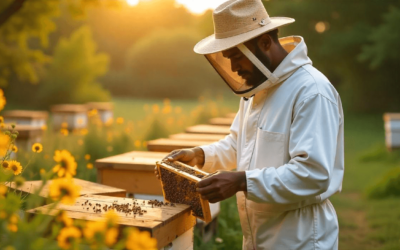Savvanah Honey, a Kenyan company that specializes in bee products, bee hives, and honey, has introduced a new product that is revolutionizing the beekeeping industry in Kenya: the stainless steel honey warmer.
Beekeeping is an important source of livelihood for many people in Kenya, especially in rural areas. However, one of the biggest challenges that bee farmers face is maintaining the quality of their honey. Honey needs to be kept at a consistent temperature to prevent crystallization and maintain its flavor and nutritional value. Traditionally, bee farmers in Kenya would use open fires or hot water baths to warm their honey, which was not only time-consuming but also posed a safety risk.
The stainless steel honey warmer from Savvanah Honey solves this problem by providing a safe and efficient way to warm honey. Made from high-quality stainless steel, the honey warmer has a temperature control feature that allows bee farmers to set the desired temperature for their honey. The warmer also comes with a lid to prevent contamination and maintain the quality of the honey.
The benefits of using a stainless steel honey warmer are numerous. Firstly, it saves time and labor. With the traditional methods, bee farmers had to constantly monitor the temperature of the honey, which required a lot of time and attention. The stainless steel honey warmer, on the other hand, allows bee farmers to set the temperature and leave the honey to warm up on its own, freeing up their time to focus on other aspects of beekeeping.
Secondly, the stainless steel honey warmer helps to maintain the quality of the honey. By keeping the honey at a consistent temperature, it prevents crystallization and maintains the flavor and nutritional value of the honey. This is especially important for bee farmers who sell their honey as a premium product.
Finally, the stainless steel honey warmer is safe to use. Unlike the traditional methods, which posed a fire risk, the honey warmer is electrically powered and has built-in safety features to prevent accidents.
Savvanah Honey has been selling the stainless steel honey warmer to bee farmers in Kenya for several months now, and the feedback has been overwhelmingly positive. Bee farmers have reported that the honey warmer has made their lives easier and has helped them to produce higher-quality honey.
The introduction of the stainless steel honey warmer by Savvanah Honey is a game-changer for bee farmers in Kenya. It provides a safe, efficient, and convenient way to warm honey, which saves time and labor, maintains the quality of the honey, and is safe to use. With this new technology, bee farmers in Kenya can now focus on what they do best: producing high-quality honey that is not only delicious but also supports their livelihoods.
Furthermore, the stainless steel honey warmer is also environmentally friendly. Compared to traditional methods that require firewood or charcoal, the honey warmer uses electricity, which is a cleaner and more sustainable source of energy. This is particularly important in Kenya, where deforestation is a major environmental issue.
Savvanah Honey is committed to promoting sustainable beekeeping practices in Kenya. In addition to providing bee farmers with high-quality products like the stainless steel honey warmer, they also offer training and support to help bee farmers improve their beekeeping techniques and increase their yields. By promoting sustainable beekeeping practices, Savvanah Honey is not only supporting the livelihoods of bee farmers but also helping to protect the environment.
The stainless steel honey warmer is just one of the many products offered by Savvanah Honey. They also sell a range of beekeeping equipment, such as bee hives, smokers, and protective gear, as well as a variety of honey and other bee products. All of their products are of the highest quality and are designed to help bee farmers improve their yields and produce high-quality honey.
Bee-Keeping Industry In Kenya
Beekeeping is an important industry in Kenya, providing employment and income to thousands of small-scale farmers. The country is known for its high-quality honey, which is sought after both locally and internationally. However, beekeeping in Kenya is faced with a number of challenges, including pests and diseases, lack of access to markets, and inadequate beekeeping equipment and tools.
Savvanah Honey has been working to address some of these challenges by providing bee farmers with high-quality equipment and training. The company was founded in 2010 with the goal of promoting sustainable beekeeping practices in Kenya. They work with a network of bee farmers across the country, providing them with bee hives, protective gear, and other equipment, as well as training and support.
In addition to the stainless steel honey warmer, Savvanah Honey also sells a range of other products that are designed to improve beekeeping practices in Kenya. For example, they offer bee hives that are made from locally sourced materials and are designed to be more durable and resistant to pests and diseases. They also sell protective gear, such as suits and gloves, to help bee farmers stay safe while working with their bees.
Savvanah Honey is also committed to promoting the use of natural and organic methods in beekeeping. They encourage bee farmers to use natural methods of pest and disease control, such as planting companion crops and using natural predators, rather than relying on chemical pesticides. This not only helps to protect the environment but also produces healthier bees and higher-quality honey.
Benefits
The introduction of the stainless steel honey warmer by Savvanah Honey is just one example of the company’s commitment to promoting sustainable beekeeping practices in Kenya. By providing bee farmers with high-quality equipment and training, and promoting natural and organic methods of beekeeping, Savvanah Honey is helping to support the livelihoods of small-scale farmers while also protecting the environment and producing high-quality honey.
Furthermore, the use of the stainless steel honey warmer has helped to address another major challenge faced by bee farmers in Kenya – the issue of honey adulteration. Adulteration is a common problem in the honey industry, where honey is often mixed with other substances, such as sugar syrup or corn syrup, to increase the volume and lower the cost. This not only reduces the quality of the honey but also makes it difficult for farmers to compete in the market.
By using the stainless steel honey warmer, bee farmers can maintain the quality of their honey and ensure that it is free from contaminants. The honey warmer heats the honey to a precise temperature, which helps to dissolve any crystallization and eliminate any moisture or impurities. This results in a higher-quality, more consistent product that is more attractive to buyers.
The use of the stainless steel honey warmer has also made the honey extraction process easier and more efficient. Traditionally, bee farmers would have to heat their honey using firewood or charcoal, which is time-consuming and can be dangerous. With the honey warmer, however, the heating process is automated, and the temperature can be precisely controlled. This not only makes the process safer but also allows bee farmers to extract their honey more quickly and efficiently.
In addition to these benefits, the stainless steel honey warmer is also easy to clean and maintain. It is made from high-quality stainless steel, which is durable and resistant to corrosion and rust. This means that it can be used for many years without needing to be replaced, making it a cost-effective investment for bee farmers.
Success
The introduction of the stainless steel honey warmer by Savvanah Honey has been instrumental in the success of many bee farmers in Kenya. By providing bee farmers with high-quality equipment and training, the company has helped to improve their beekeeping practices, increase their yields, and produce high-quality honey.
One example of a successful bee farmer in Kenya is Richard Turere. Richard is a young Maasai boy who was inspired to become a beekeeper after losing his family’s cattle to lions. He started with just a few beehives and gradually expanded his operation over the years. With the help of companies like Savvanah Honey, Richard has been able to improve his beekeeping practices and increase his yields. He now sells his honey to local markets and has even been featured on international news channels for his innovative approach to lion conservation.
Another successful bee farmer in Kenya is Caroline Kariuki. Caroline is a single mother who started her beekeeping business with just one hive. She joined a local beekeeping group that was supported by Savvanah Honey, where she received training and support. With the help of the group, Caroline was able to expand her operation and now has over 300 hives. She has also been able to diversify her income by selling other bee products, such as beeswax candles and honey-based skincare products.
Moreover, the success of bee farmers in Kenya is not just limited to their individual businesses but also has a positive impact on their communities and the environment. Beekeeping is a sustainable and environmentally-friendly practice that promotes biodiversity and supports natural ecosystems. As bee farmers increase their bee colonies and production, they also help to increase pollination rates and promote the growth of crops and other plants in the surrounding area.
Additionally, the success of bee farmers in Kenya also helps to boost the country’s economy. Kenya is one of the leading honey producers in Africa, and its honey is in high demand in both local and international markets. The honey industry in Kenya generates significant income for the country and provides employment opportunities for thousands of people.
The success of bee farmers in Kenya is a testament to the importance of sustainable agriculture and the role that companies like Savvanah Honey play in supporting it. By providing bee farmers with the necessary tools and resources, these companies are helping to create a more prosperous and sustainable future for bee farmers, their communities, and the environment.
These success stories are just a few examples of the many bee farmers in Kenya who have been able to improve their livelihoods with the help of companies like Savvanah Honey. By providing bee farmers with high-quality equipment and training, and promoting sustainable beekeeping practices, these companies are helping to create a more prosperous and sustainable future for bee farmers in Kenya.
Challenges and Opportunity
Like any industry, the honey industry in Kenya also faces its fair share of challenges and opportunities. Some of the challenges that bee farmers in Kenya’s face include:
- Climate change: The changing weather patterns, droughts, and unpredictable rainfall are posing a significant challenge to beekeeping in Kenya. These factors affect the growth and health of the flowering plants and affect the production of honey.
- Pest and diseases: Bee colonies are vulnerable to various pests and diseases, including varroa mites, wax moths, and American foulbrood disease. These pests and diseases can quickly spread and cause significant damage to the bee colonies.
- Lack of access to markets: Although Kenya is one of the leading honey producers in Africa, many bee farmers still struggle to access markets and sell their honey at fair prices.
Despite these challenges, there are also opportunities for bee farmers in Kenya, including:
- Growing demand for honey: The demand for natural, organic, and locally-produced honey is on the rise in Kenya and other parts of the world. This presents a significant opportunity for bee farmers to increase their production and income.
- Government support: The government of Kenya has recognized the potential of the honey industry and has implemented various policies and initiatives to support bee farmers. For example, the government has set up honey processing plants and provided training and extension services to bee farmers.
- Technological advancements: As we have seen with the introduction of the stainless steel honey warmer, technology can play a significant role in improving beekeeping practices and increasing yields. Advancements in beekeeping technology can help bee farmers overcome the challenges they face and improve their efficiency and productivity.
While the honey industry in Kenya faces several challenges, there are also opportunities for growth and success. By addressing the challenges and leveraging the opportunities, bee farmers in Kenya can continue to improve their practices, increase their yields, and contribute to the country’s economy and environment.




0 Comments